Planting method and Propagation of Flowers-- Iron Tree
The iron tree is evergreen all the year round and is a better ornamental plant, which can beautify the courtyard and bedroom.
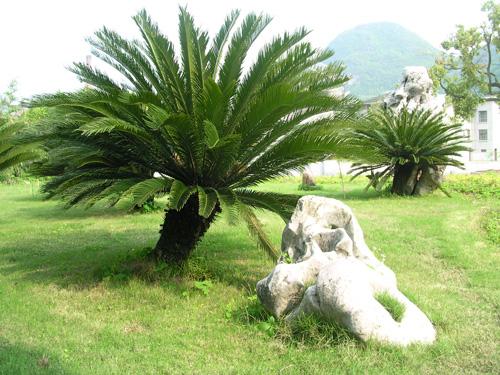
In the tropics, iron trees bloom every year about ten years later, while they generally do not blossom in temperate zones. The iron tree flower is dioecious, and the male flowers are arranged like a spiral, like a pineapple, covered with velvet hair, yellowish at first and brown after maturity. The female flower is larger, with palmlike scales, and is shaped like a flat cylinder. The flowering period is from July to August. Here is a detailed introduction to how to raise the iron tree.
1. Soil selection of Iron Tree Culture
Iron tree is suitable to grow in fertile, slightly acidic sandy soil. The cultivated soil can be prepared with 1 part of coarse sand and 4 parts of pastoral soil, 5 parts of rotten leaf soil and 1 part of fine stone grain, or 2 parts of sandy soil and 2 parts of rotten leaf soil.
Cymbal
Iron tree is an iron-loving plant, which can be mixed with a small amount of iron shavings when preparing culture soil, or iron shavings can be removed from the basin soil or buried in the basin in early spring. Iron gradually seeps in and is absorbed. 0.5% ferrous sulfate spray can also be used to supplement iron to make the leaves firm and green. Before planting, put 5 cm thick coarse sand or gravel as seepage layer, and use mature bean cake fertilizer as base fertilizer. After planting, pour water thoroughly and leave it in a cool place for half a month, then it can be used as an ornamental.
two。 Fertilization method of Iron Tree Culture
Compound fertilizer or urea can be applied twice a month from May to October. Urea had better be diluted 1000 times with water to spray leaves, and foliar fertilizer should follow the principle of "eat less and eat more". The family's daily rice washing water should not be stained with oil and water. It should be filled with buckets and pots and irrigated with liquid fertilizer the next day, which has a certain fertilizer effect.
During the growing period, Tieshu was fertilized with fertile and diluted bean cake every 20 days. In order to make the leaves moist and green, a small amount of ferrous sulfate can be added to fertilizer and water.
3. Watering method of Iron Tree Culture
After the temperature stabilized in late April, the irontree pot was moved outdoors, watered once, and then properly controlled for a period of time until the occurrence of new leaves. After the new leaves are unfolded, the lower withered and yellow leaves should be cut off to make the plants colorful. During the peak growth period in summer, it is watered every 1-2 days, and the rotten cake fertilizer or human feces and urine are applied once a month to maintain sufficient moisture and nutrition in the soil. After the beginning of autumn, the temperature gradually decreased and the plant growth slowed down, so it was appropriate to water the plant twice. Before Frosts Descent, he moved to Ningnei for the winter and twisted the watering system to keep the basin semi-dry.
The iron tree grows slowly and does not like flood, especially in spring, autumn and winter, the principle of wet and dry must be strictly observed, that is, after watering once, the basin soil should be watered again. Except for cloudy and rainy days in summer, water should be watered and sprayed to the leaves once a day, but stagnant water is avoided, otherwise rotten roots will cause death.
Watering work in spring and summer, watering can be a little more, in order to keep the soil moist, grow slowly after autumn, moisture should be controlled to maintain a certain degree of dryness in order to survive the winter.
Cymbal
4. Temperature requirements for Iron Tree Culture
The suitable temperature for the growth of iron tree is 20-30 ℃, but it is more resistant to high temperature and severe cold. In winter, about 5 ℃ below zero can still overwinter outdoors, and below 10 ℃ should be protected. The iron tree is afraid of snow, if it snows, it should be moved indoors or covered with plastic film, otherwise the old leaves will turn yellow at the beginning of the next spring and lose their ornamental value.
Tieshu prefers a sunny, humid and ventilated environment. The north can be moved outdoors in early April and in the greenhouse before Frosts Descent in November. The room temperature should be kept between 7 and 10 ℃, but it can also withstand the low temperature of 0.5 ℃ without freezing damage.
5. The Illumination requirements of Iron Tree Culture
Tieshu prefers a warm, humid environment with plenty of light and should be placed in a place where the sun shines directly. However, potted iron trees are not resistant to hot sun exposure, especially the new leaves of iron trees are very easy to burn and turn yellow. Therefore, after the growth of new leaves and the height of summer, certain shading conditions should be given.
Iron tree is a positive tree species, it is best to keep it in a sunny environment. In the midsummer season, the sun is strong around noon, so it should be shaded properly. Especially in the process of new leaf growth, it should not be placed in strong light, otherwise the new leaf will appear scorched edge or withered tip phenomenon.
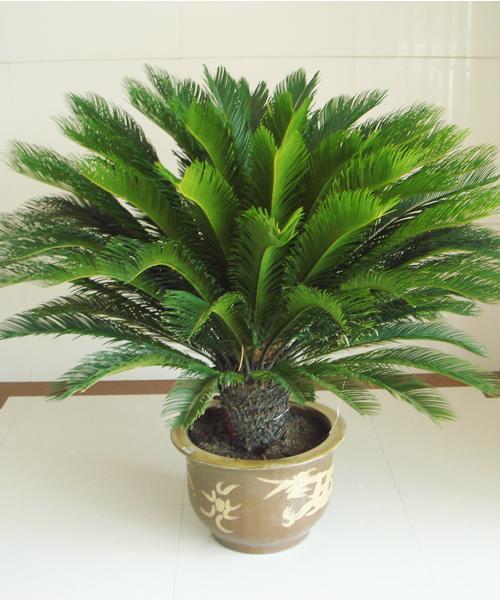
6. Prevention and Control of Diseases and insect pests in Iron Tree Culture
① spot disease: fungal disease. In high temperature and rainy weather, the disease is easy to spread. The leaves are light brown spots at the beginning after infection, and then spread in a nearly round or irregular shape, with a diameter of 1mm to 5mm, resulting in orange death and fragmentation of the leaves. In terms of prevention and treatment, there is more water in summer, and the diseased old leaves should be removed in time. At the initial stage of the disease, 75% of Bai Yin Qing wettable powder 800 times liquid, or 50% Topurazine wettable powder 800 times liquid, about 10 days spray once, the effect is better.
② scale insects: planted and maintained on the balcony, the ventilation and light transmission is not good enough, and the leaves are often vulnerable to shell insects. Repeatedly rub the damaged leaves with alcohol. It can kill adults and larvae; soak rice vinegar with cotton balls and gently rub damaged leaves to kill shell insects.
Cymbal
7. Matters needing attention in Iron Tree Culture
The main results are as follows: (1) Tieshu prefers warm and well-ventilated environment, which is suitable for acidic and fertile sandy soil. Usually should be placed in a sunny place, watering should be moderate, avoid stagnant water, so as not to rot roots and leaves yellow. The iron tree should turn the basin and change the soil once every 3 years. You can put some scrap iron in the basin to increase the iron quality and make the branches and leaves more elegant. Tieshu is easy to be infected with soot, which can be prevented and treated with 1000 times bacilli special solution. Usually, warm cloth can be used to wipe the leaves, which can not only keep clean and beautiful, but also prevent the infection of diseases and insect pests.
(2) the heart at the top of the root and stem of the iron tree is poisonous, so full attention should be paid to the medicinal use of the root and stem of the iron tree.
(3) Indoor potted iron trees must not use clayey soil. Iron trees like fertilizer, especially iron fertilizer. In order to keep the leaves moist, greenish, shiny and shiny, thin liquid fertilizer can be applied once or twice in late spring and early summer, and ferrous sulfate solution can be added. Broken iron shavings are often used as basic fertilizer among the people. In early spring, the broken iron shavings are put on the basin soil, and after normal watering and maintenance, the iron rust gradually seeps into the basin soil, which also has a certain effect.
(4) the summer weather is hot, the iron tree often appears the situation of dim color, in order to improve the dim color of this situation, you can add a small amount of ferrous sulfate to the fertilizer and water, the amount should not be too large, can not make the basin soil stagnant water, avoid causing rotten roots and yellow leaves.
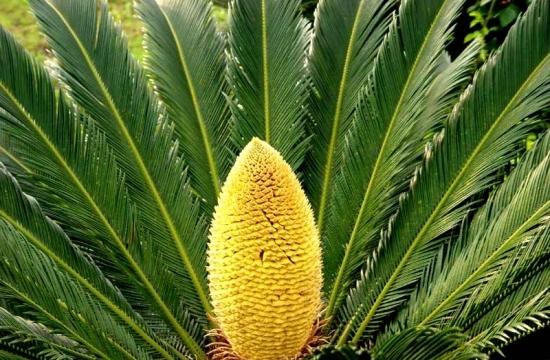
8. Propagation methods of Iron Tree Culture
The propagation of iron tree is usually propagated by sowing and dividing plants. When male and female plants bloom at the same time, seeds can be easily obtained by artificial pollination. When the large seed sowing method was used, the seeds germinated slowly, and the seedlings began to emerge 4-6 months after sowing, and the seedlings were separated 2-3 years later. In general, seeds are rarely obtained when planted in the north, and the method of plant division is often used to propagate.
Strong perennial plants often produce tiller buds at the base, cut off the three-year-old tiller buds with 4 or 5 leaves, plant them in a flowerpot filled with river sand, plant them at a depth of about half the plant height, pour water through them, and place them in a shaded place to promote root maintenance. The potted soil should be dry rather than wet. Generally, it begins to take root in 2-3 months, and then potted with rotten leaf soil after rooting.
- Prev
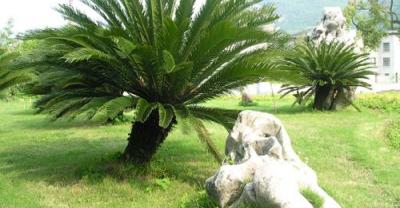
Dental experts say dental implants
"come on, Chinese team! I will always believe in you! " Then a ball flew over and the tooth was gone. Dr. Bob said that in this case, it is better to implant teeth. The dental implant is.
- Next
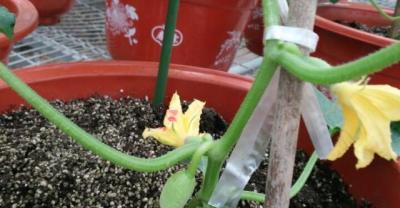
When to plant towel gourd: can be planted in four seasons
Towel gourd is an annual herb of Cucurbitaceae. Towel gourd is widely cultivated in the south and north of China, as well as in the temperate and tropical regions of the world. South Yunnan.
Related
- Fuxing push coffee new agricultural production and marketing class: lack of small-scale processing plants
- Jujube rice field leisure farm deep ploughing Yilan for five years to create a space for organic food and play
- Nongyu Farm-A trial of organic papaya for brave women with advanced technology
- Four points for attention in the prevention and control of diseases and insect pests of edible fungi
- How to add nutrient solution to Edible Fungi
- Is there any good way to control edible fungus mites?
- Open Inoculation Technology of Edible Fungi
- Is there any clever way to use fertilizer for edible fungus in winter?
- What agents are used to kill the pathogens of edible fungi in the mushroom shed?
- Rapid drying of Edible Fungi

